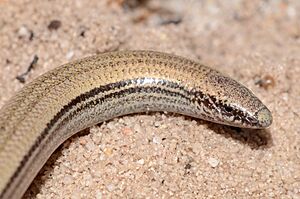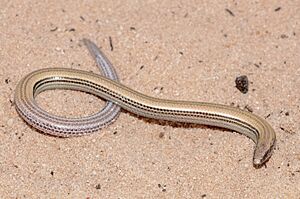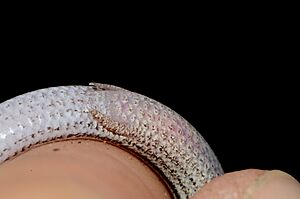Gronovi's dwarf burrowing skink facts for kids
Quick facts for kids Gronovi's dwarf burrowing skink |
|
|---|---|
 |
|
 |
|
| Conservation status | |
| Scientific classification | |
| Genus: |
Scelotes
|
| Species: |
gronovii
|
The Gronovi's dwarf burrowing skink (Scelotes gronovii) is a special type of skink. Skinks are a kind of lizard found in the family called Scincidae. This particular skink lives only in South Africa, meaning it is endemic to that country.
About Its Name
The name gronovii for this skink, both in its common name and scientific name, honors a Dutch naturalist named Laurens Theodorus Gronovius. A naturalist is someone who studies nature.
What It Looks Like
The Gronovi's dwarf burrowing skink is quite unique. It doesn't have any front legs at all! Its back legs are also special, with only one toe on each foot.
Adult skinks are usually about 5 to 6 centimeters (about 2 to 2.4 inches) long from their snout (nose) to their vent (a small opening near the tail). The longest one ever recorded was about 7 centimeters (about 2.8 inches) long.
Where It Lives
This skink likes to live in sandy areas with not too many plants. You can find it along the southwestern coast of the Western Cape in South Africa. This includes a place called Dassen Island. These skinks usually live in areas that are less than 100 meters (about 328 feet) above sea level.
How It Behaves
The Gronovi's dwarf burrowing skink spends its life on the ground. It is also a fossorial animal, which means it is very good at digging and lives mostly underground in burrows.
Reproduction
The Gronovi's dwarf burrowing skink gives birth to live young. This is called ovoviviparous. It means the mother carries the eggs inside her body until they hatch, and then she gives birth to live babies.
A mother skink usually has one or two babies at a time. When they are born, these tiny skinks are about 4 to 5 centimeters (about 1.6 to 2 inches) long, including their tail.



